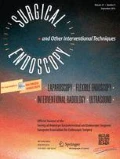Abstract
Background
There is currently great discrepancy in the training requirements between medical societies regarding the recommended threshold number of colonoscopies needed to assess for technical competence. Our goal was to determine the number of colonoscopies performed by surgical residents, rate of cecal intubation, as well as trainee perceptions of colonoscopy training after completion of their training period.
Methods
This study consisted of a 12-item electronic survey completed by 21 surgical residents after their 2-month endoscopy rotation at a tertiary care, urban referral center. This survey assessed numbers of colonoscopies performed, number successful to the cecum, and perceptions of training in colonoscopy. The cecal intubation rate was used as a surrogate marker of technical competence.
Results
Twenty-one surgical residents performed a mean of 80 ± 35 total colonoscopies during the 2-month rotation. The average cecal intubation rate was 47% (range 9–78%). Resident comfort level for independently performing a total colonoscopy was scored a mean 3.6 on scale of 1–5 (5 = most comfortable), and 43% of the surgical residents planned on performing colonoscopy after residency training.
Conclusions
Surgical residents can obtain the recommended threshold for colonoscopy (N = 50) during a standard 2-month rotation. However, no resident was able to achieve technical competence in colonoscopy as defined by a 90% cecal intubation rate. These data suggest that the method of training of general surgery residents in colonoscopy may need reappraisal.


Similar content being viewed by others
References
Society of American Gastrointestinal and Endoscopic Surgeons (SAGES) 1997 Granting of privileges for gastrointestinal endoscopy. Available at http://www.sages.org/publication/id/11/. Accessed 2 April 2009
Toolbox of Assessment Methods, ACGME. Version 1.1; September 2000. Available at: http://www.acgme.org/Outcome/assess/Toolbox.pdf. Accessed 27 Nov 2008
American Association of Family Physicians (2008) Colonoscopy (Position Paper). Available at http://www.aafp.org/online/en/home/policy/policies/c/colonoscopypositionpaper.html#Parsys0021. Accessed 2 April 2009
Accreditation Council for Graduate Medical Education (2006) Surgery policy information. Available at http://www.acgme.org/acWebsite/RRC_440/440_policyArchive.asp. Accessed 2 April 2009
Accreditation Council for Graduate Medical Education (2007) ACGME Program requirements for fellowship education in the subspecialties of internal medicine. Available at http://www.acgme.org/acWebsite/downloads/RRC_progReq/144pr707_ims.pdf. Accessed 27 November 2008
Asfaha S, Alqahtani S, Hilsden RJ, MacLean AR, Beck PL (2008) Assessment of endoscopic training of general surgery residents in a North American health region. Gastrointest Endosc 68:1056–1062
Rex DK, Petrini JL, Baron TH, Chak A, Cohen J, Deal SE, Hoffman B, Jacobson BC, Mergener K, Petersen BT, Safdi MA, Faigel DO, Pike IM (2006) Quality indicators for colonoscopy. Gastrointest Endosc 63:S16–S28
Spier BJ, Benson ME, Pfau PR, Nelligan, G, Lucey MR, Gaumnitz EA (2009) Colonoscopy training in gastroenterology fellowship: determining competence. Gastrointestinal Endoscopy (in press)
Cass OW, Freeman ML, Peine CJ, Zera RT, Onstad GR (1993) Objective evaluation of endoscopy skills during training. Ann Intern Med 118:404
Chak A, Cooper GS, Blades EW, Canto M, Sivak MV Jr (1996) Prospective assessment of colonoscopic intubation skills in trainees. Gastrointest Endosc 44:54–57
Morales MP, Mancini GJ, Miedema BW, Rangnekar NJ, Koivunen DG, Ramshaw BJ, Eubanks WS, Stephenson HE (2008) Integrated flexible endoscopy training during surgical residency. Surg Endosc 22:2013–2017
Kowalski T, Kanchana T, Pungpapong S (2003) Perceptions of gastroenterology fellows regarding ERCP competency and training 58:412–414
Disclosures
Drs. Bret J. Spier, Emily T. Durkin, Andrew J. Walker, Eugene Foley, Eric A. Gaumnitz, and Patrick R. Pfau have no conflicts of interest or financial ties to disclose.
Author information
Authors and Affiliations
Corresponding author
Appendix
Appendix

Rights and permissions
About this article
Cite this article
Spier, B.J., Durkin, E.T., Walker, A.J. et al. Surgical resident’s training in colonoscopy: numbers, competency, and perceptions. Surg Endosc 24, 2556–2561 (2010). https://doi.org/10.1007/s00464-010-1002-5
Received:
Accepted:
Published:
Issue Date:
DOI: https://doi.org/10.1007/s00464-010-1002-5



